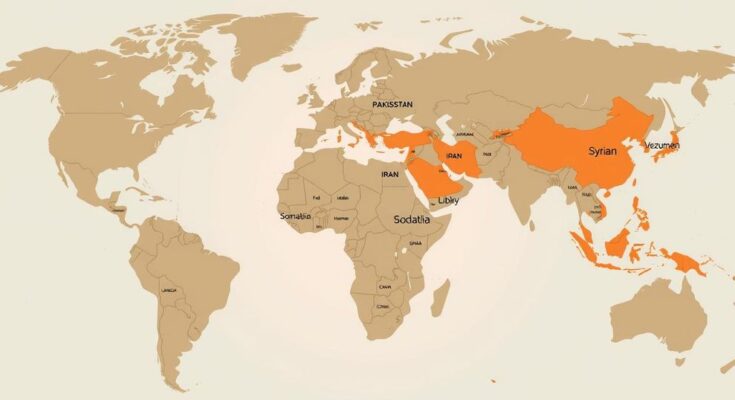The Trump administration is preparing to implement new U.S. entry restrictions for countries including Afghanistan, Pakistan, and Iran, based on security screening concerns. This follows an Executive Order mandating a review of vetting procedures. Widespread opposition from various advocacy groups and civil rights organizations highlights the potential negative impacts on refugees and visa applicants.
The Trump administration is reportedly preparing to impose new entry restrictions for travelers from several countries, including Afghanistan, Pakistan, Iran, Libya, Somalia, Sudan, Syria, Yemen, Chad, North Korea, and Venezuela. This potential move follows an Executive Order signed on January 20, which directed federal agencies to evaluate countries lacking sufficient security vetting processes. An official announcement regarding the specific nations affected is anticipated in the near future.
During his first term, President Trump enacted a series of travel bans commencing in 2017, initially targeting Muslim-majority nations. This policy faced substantial backlash, with critics labeling it a “Muslim Ban,” and despite facing legal challenges, the U.S. Supreme Court upheld the third version in 2018, citing the President’s authority to enforce national security.
While the final list of countries facing restrictions is not confirmed, Afghanistan and Pakistan are under scrutiny. Advocacy organizations, such as the International Refugee Admissions Project (IRAP), caution that these restrictions could have grave implications, particularly for Afghan refugees, including those holding Special Immigrant Visas who are escaping Taliban repression.
Furthermore, Pakistan’s security issues and supposed failures in vetting processes have brought it under review. Inclusion in the ban could adversely affect numerous Pakistani nationals seeking to obtain U.S. visas. Civil rights groups, including the American Civil Liberties Union (ACLU), denounce the proposed restrictions.
Critics assert that the Department of State and Department of Homeland Security (DHS) already enforce stringent vetting measures, rendering further restrictions unnecessary. Under the Executive Order’s directive, both departments must finalize their assessments within 60 days. The deadline is nearing, with an official announcement expected shortly.
In summary, the Trump administration’s consideration of new travel restrictions impacting numerous countries raises significant concerns regarding the implications for refugees and secure vetting processes currently in place. The anticipated announcement will clarify which nations may face these new limitations, highlighting ongoing debates over national security and civil rights in the context of immigration policy.
Original Source: www.travelandtourworld.com




